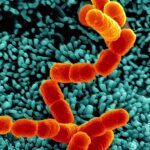Lien vers Pubmed [PMID] – 20815828
Mol. Microbiol. 2010 Nov;78(4):809-19
The molecular basis of the regulation of specific shapes and their role for the bacterial fitness remain largely unknown. We focused in this study on the Gram-negative and spiral-shaped Helicobacter pylori. To colonize its unique niche, H. pylori needs to reach quickly the human gastric mucosa, by swimming to and through the mucus layer. For that reason, the specific shape of H. pylori is predicted to be necessary for optimal motility in vivo, and consequently for its colonization ability. Here, we describe the involvement of a PG-modifying enzyme, HdpA (HP0506), in the mouse colonization ability of this bacterium, by regulating its shape. Indeed, the inactivation of the hp0506 gene led to a stocky and branched phenotype, affecting H. pylori colonization capacity despite a normal motility phenotype in vitro. In contrast, the overexpression of the hp0506 gene induced the transformation of H. pylori from rod to dividing cocci shaped bacteria. Furthermore, we demonstrated by PG analysis and enzymology, that HdpA carried both d,d-carboxypeptidase and d,d-endopeptidase activities. Thus, HdpA is the first enzyme belonging to the M23-peptidase family able to perform the d,d-carboxypeptidation and regulate cell shape.



